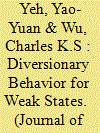|
|
|
Sort Order |
|
|
|
Items / Page
|
|
|
|
|
|
|
| Srl | Item |
| 1 |
ID:
173981


|
|
|
|
|
| Summary/Abstract |
This paper explores the mechanisms and circumstances under which leaders in weak states adopt diversionary behavior to deal with domestic problems. We examine the case of Taiwan to see if its President, Tsai Ingwen, has adopted diversionary behavior from 2016 to the present. We found that, unlike great powers, weak-state leaders often resort to non-force tactics such as blaming foreign opponents, but the emergence of diversionary behavior is conditional on the stability of their relationship with a major power. In the case of Taiwan, Tsai adopted a more confrontational foreign policy toward China only when USA–Taiwan relations had become more stable and more favorable toward Taiwan. Future work could continue to explore the circumstances and tools unique to weak states’ diversionary behavior.
|
|
|
|
|
|
|
|
|
|
|
|
|
|
|
|
| 2 |
ID:
092260


|
|
|
|
|
| Publication |
2009.
|
| Summary/Abstract |
Much has been written on the triangular, and increasingly high-profile, China-Taiwan-US relations. However, scholars have yet to apply Diversionary Theory to the China-Taiwan dyad. DT argues that leaders may resort to international conflict when domestic political and economic situations become troublesome, aiming at directing public attention away from problems at home. While creation of explicit military conflict in the Taiwan Strait by Taipei is deemed quite unlikely, more subtle processes of diversion might be expected instead. This article applies a variant on DT to assess whether leaders in Taipei have used rhetoric about Taiwan independence or unification as a distraction from domestic problems during the years leading up to Taiwan's 2004 presidential election. We find that, as the president's approval sinks, pro-independence rhetoric becomes more likely. Overall, the results of this study confirm extension of DT to the case of Taiwan and encourage further research applied to middle powers.
|
|
|
|
|
|
|
|
|
|
|
|
|
|
|
|
| 3 |
ID:
104053


|
|
|
|
|
| Publication |
2011.
|
| Summary/Abstract |
This article examines the causation and extent of interstate crisis escalation among two conflictual dyads, namely Greece-Turkey and India-Pakistan. It draws from the International Crisis Behaviour dataset to present a new sub-dataset of 12 interstate crises involving the two dyads in the period 1987 to 2002. While crisis behaviour in Greece-Turkey has frequently been analysed within the context of two major regional organizations (NATO and the EU), Indian-Pakistani crises have been studied within the perspective of nuclear proliferation. To examine the linkage between these features and interstate crises, the article operationalizes the security dilemma and the diversionary theory of war through a probabilistic model. Using Ragin's (2000) comparative qualitative analysis, it demonstrates that both the security dilemma and diversionary theory explain crisis escalation, although the latter covers more cases with a smaller margin of error. Moreover, the article demonstrates that Greek-Turkish crises have generally escalated to relatively low levels of conflict (threat of war or show of force), while Indian-Pakistani crises have spiralled to higher levels of confrontation (use of force). In both dyads, nuclear weapons and regional organizations have shaped the boundaries of possible escalatory action. The EU and NATO have contributed to mitigating crisis escalation and the use of force between the Aegean neighbours, while unintentionally encouraging low intensity confrontations; meanwhile, in South Asia, nuclear weapons in combination with fragile domestic regimes have exacerbated crises, particularly in the form of state-sponsored unconventional warfare.
|
|
|
|
|
|
|
|
|
|
|
|
|
|
|
|
| 4 |
ID:
171200


|
|
|
|
|
| Summary/Abstract |
Since Korea's transition to democracy in 1987, Korean leaders have become increasingly confrontational toward Japan, with such steps ranging from verbal threats filled with hawkish rhetoric to material threats, such as displays of military force and threats of actually using it. To explain South Korean leaders’ hawkish approach to Japan, we build a theory of “prospective diversion” by combining insights from the diversionary theory of international conflict and prospect theory. We argue that foreign policy leaders have a strong tendency to overvalue political losses relative to comparable gains in their approval ratings. As a result, they are inclined to take risk-seeking diplomatic actions toward foreign adversary to avoid further losses. By conducting statistical analyses and developing case studies of Korean leaders’ confrontational policy decisions regarding Japan, we present empirical findings consistent with our hypothesis that Korean leaders are inclined to engage in prospective diversion toward Japan when they suffer domestic losses. This article provides an enhanced understanding of the domestic political foundation of South Korean leaders’ increasingly contentious attitude toward Japan.
|
|
|
|
|
|
|
|
|
|
|
|
|
|
|
|
|
|
|
|
|